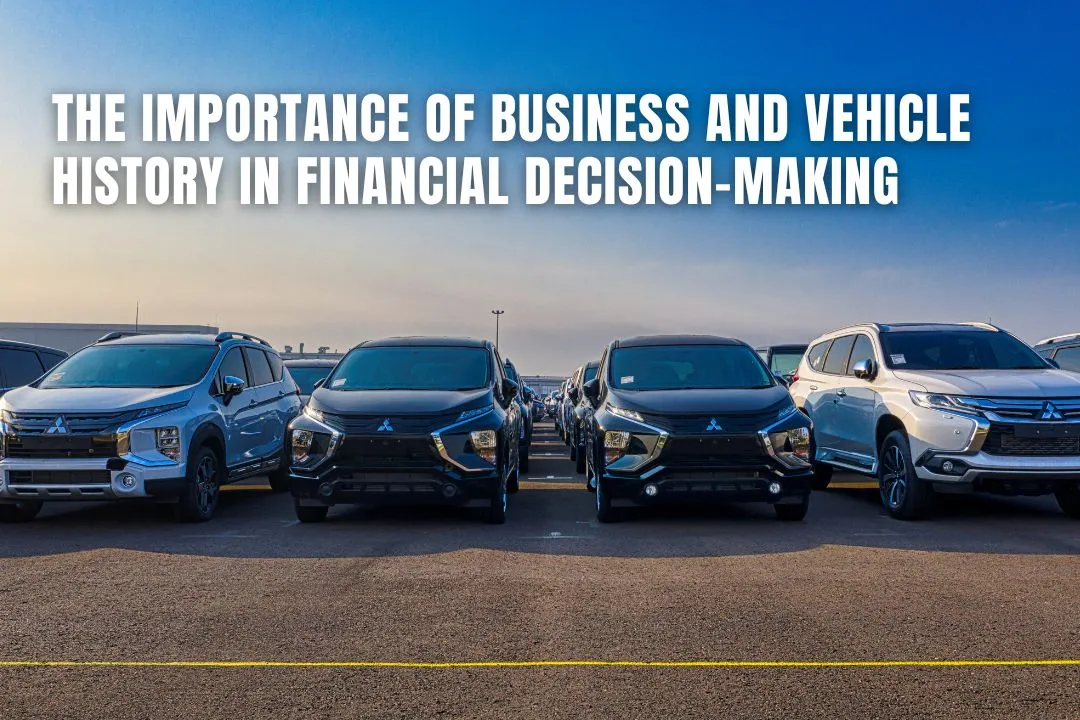
Editorial Disclaimer
This content is published for general information and editorial purposes only. It does not constitute financial, investment, or legal advice, nor should it be relied upon as such. Any mention of companies, platforms, or services does not imply endorsement or recommendation. We are not affiliated with, nor do we accept responsibility for, any third-party entities referenced. Financial markets and company circumstances can change rapidly. Readers should perform their own independent research and seek professional advice before making any financial or investment decisions.
In today’s economy, money talks—but history whispers the truth. Whether you’re buying a used car for your small business or considering a financial stake in an established company, knowing the backstory behind your investment is essential. It’s not just about ticking boxes. It’s about understanding what you’re truly getting into.
Both business and vehicle history have the power to shape financial decisions. When overlooked, they can introduce risk, lead to unexpected costs, or even damage your reputation. But when used wisely, they can uncover opportunity, offer peace of mind, and ultimately help you make smarter, more confident choices.
Let’s talk about why that matters.
When people think about investing in a business, they often focus on what’s happening right now—sales figures, branding, and current customer base. And sure, those things matter. But they don’t tell the whole story.
Financial statements over a single quarter won’t show long-term behaviour. But three years of records? That gives you patterns. Maybe revenue spikes every December but drops each summer. Maybe expenses have climbed steadily while profits stagnated. Recognising these trends helps you anticipate what to expect—and avoid relying on guesswork.
Additionally, history can reveal how a business handled tough times. Did the team adapt during market changes or crumble under pressure? This kind of resilience (or lack thereof) is invaluable insight for anyone considering getting involved financially.
It’s not just numbers that matter. You also want to know how a business has operated ethically and legally. Lawsuits, tax penalties, unpaid debts, or even bad press can all hurt future performance.
This is especially true for partnerships and acquisitions. You don’t want to find out later that your new business partner has a trail of broken contracts behind them. It’s not about digging dirt—it’s about making sure you’re not walking into a mess.
On the surface, vehicles are easier to assess than businesses. You can test drive them, pop the hood, and kick the tires. But just like with a business, appearances can be deceiving.
For many people, especially business owners who rely on cars, vans, or trucks, buying a vehicle is a major financial move. And just like with any other investment, you need to know where it’s been before you commit.
A clean-looking car might still have been in a major accident. Or maybe it was used as a rental or rideshare vehicle and driven far harder than expected. You won’t know any of that from a walk-around or test drive.
That’s where a proper history report comes in. It can tell you if the vehicle has been written off by insurers, tampered with, flooded, or if the odometer has been rolled back. It can even show whether the car has outstanding finance tied to it.
If you’re looking to buy a used vehicle, doing a car history check is one of the simplest ways to protect yourself. It’s fast, affordable, and gives you a clearer picture of what you’re buying into before any paperwork is signed.
The truth is, no financial decision happens in a vacuum. Everything has a past, and that past informs the future. When you take the time to look into a business’s background or a vehicle’s history, you’re not just gathering data—you’re building context.
Unexpected issues are often the downfall of otherwise good deals. A used car might need a new transmission. A business might be behind on payroll taxes. If you don’t find out until after the fact, you’re the one holding the bag.
Spending a little time and effort upfront can help you avoid massive headaches later. That’s why history matters. It gives you a heads-up about the potential problems—and lets you walk away from a bad deal before you’re in too deep.
Beyond risk, knowing the history helps you feel good about your decision. There’s a huge difference between hoping something will work out and knowing you’ve done your homework.
When you’ve reviewed the full financial background of a business, you can plan growth strategies with more clarity. When you’ve checked a vehicle’s records, you can invest confidently knowing it won’t leave your delivery driver stranded.
Doing your due diligence doesn’t have to be overwhelming. In fact, it’s easier than ever to gather the information you need. For vehicles, online tools make it possible to get detailed reports with just a few clicks. For businesses, requesting historical financials, reviewing credit reports, and researching online reviews and legal records are all smart, accessible steps.
The cost of skipping these checks? It could mean losing thousands—or worse, damaging your credibility. But the upside of taking them seriously is immense: better decisions, fewer surprises, and stronger financial health.
Also see: Key Financial Aspects You Should Consider Before Launching Your Business
Here’s the thing: past performance might not guarantee future results, but it definitely provides clues. Whether you're buying a secondhand utility van or investing in a growing startup, the history behind the asset helps you make informed, intentional choices.
So next time you're faced with a major purchase or investment, don't just trust the glossy brochure or the sales pitch. Go a little further. Ask the right questions. Look under the hood—figuratively and literally. Because the more you know, the better off your bottom line will be.